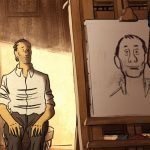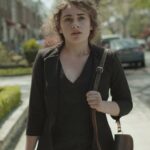Paige Johnson reviews The Portrait, a masterclass in madness on screen, premiered at Raindance Film Festival.
A psychological thriller with exquisite attention to detail and suspense build-up, director Simon Ross and writer David Griffiths deliver a master class in how to weave art forms into narrative, walk the line between sanity and madness, and explore grief.
The film opens with a man dragging a woman kicking and screaming by her hair up a path lined by trees—it is in medias res, yet not, as the scene is a flashback that we become aware of as the plot develops. There is no question of whether this film will weigh lightly on the heart. This is a man defined by his violence toward women, a motif that persists throughout the film. The narrative follows Sofia (Natalia Cordova-Buckley), who takes her husband Alex (Ryan Kwanten), a mute and violent blank slate of a man from a brain injury, to his childhood home in the hope that familiar surroundings will trigger a memory and bring him back to her. She discovers a painting in the attic, a self-portrait of Alex’s ancestor, Calvin, only he looks exactly like Alex.
Sofia begins to worry. She is going mad because Calvin is leaving the painting and terrorizing her. Alex, from Sofia’s perspective, is on the threshold of regaining his sanity. They are like two sides of the same coin, both balancing precariously on the reeded edge. Calvin, having painted himself into the self-portrait, occupies a liminal space; when he leaves it and stalks the house, all that’s left is the deep blue background. Sofia and Alex are often shot standing in doorways, which is especially effective at night when Sofia is in a dark room at a window or door, her silhouette backlit. The threshold effect doubles: she occupies a physical transitory space, is framed by the camera, and only the outline of her body is visible in the dark, a visual liminal perspective for the audience. The stylized shots build anticipation and leave no breathing room for the audience; there is never space to relax. We are always on the edge of our seats, dreading a jump scare.
Violence is a source of both catharsis and dread in this film. Alex seems to always be on the verge of lashing out, hitting Sofia, a police officer, the gardener. You never know when he will, and it is so sudden and swift that it is effectively its own jump scare. Calvin, with his penchant for broken women, takes out his jealousy by assaulting them and killing the men he perceives as threats, like the gardener. The film culminates in a confusion of confrontation, when Sofia goes to slash the painting, Calvin escapes, her knife disappears, and Alex slashes her face, both arms, and both legs, in viciously quick and hard to watch slices, before Sofia embraces him and stabs him in the back, the two of them collapsing on the stairs. The shot in the morning, when the police enter the house and we see Sofia still cradling Alex’s body, both of them covered in blood, is reminiscent of Caravaggio’s The Entombment of Christ, or Michaelangelo’s Pietà.
The catharsis comes in knowing it was a mercy killing, that Sofia was finally able to say good-bye to someone she loved who was physically alive but did not exist within their mind anymore. While a psychological thriller, this film is a meditation on grief, and explores its impact on the distinction between the mind and reality. Blue remains an overtone throughout, tinging every scene with grief and melancholy and gravitas. The film explores how grief carries its own sense of suspense; it can hit you out of nowhere, jump-scare you, make you feel like you are losing your sanity. Grief stands on its own threshold, ready to step in at any moment. Sofia killing her husband is an act of compassion both for him and for herself; when she killed him she killed their marriage and she killed the person she was within that marriage. Three deaths wrapped into one. Her actions ask the audience, when is killing a kindness?
Griffiths decides to, rather than traditionally leaving open to question whether Sofia is mad or whether there really is a murderous man in the portrait, commit to both answers. Sofia is visited by Alex’s sister, Mags, in what is insinuated to be a mental hospital, and she says she needed Calvin to be able to let go of Alex. It leaves us to contemplate whether we could let go of someone we love—who is alive, but not in a way they would ever want to be, a vegetable—without an external push. The last scene is an auction, put on by Mags, selling the enormous self-portrait of Calvin, which is bid on and won by a woman with a sick husband. The shot is of the self-portrait, which no longer looks like Alex, but like this new woman’s sick husband: changed by the eye of the beholder and on the hunt once again.
The Portrait was released on 20 October 2023. Viewed at Raindance Film Festival.




